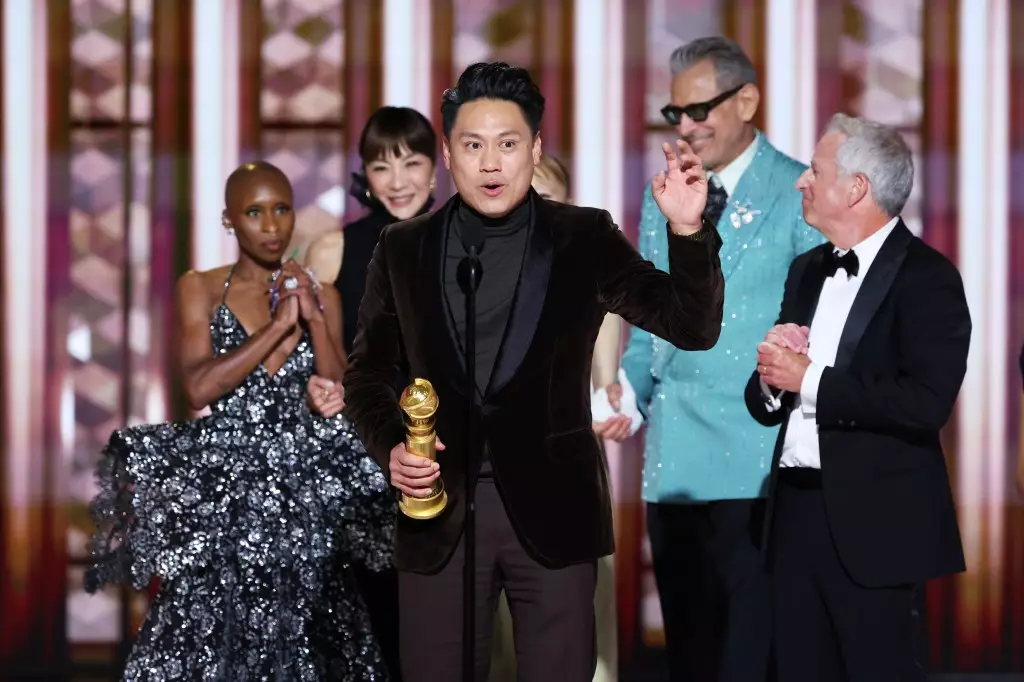At the recent Golden Globe Awards, director Jon M. Chu captivated the audience as he accepted the award for Cinematic and Box Office Achievement for his film Wicked. His heartfelt speech resonated with themes of optimism and the vital importance of storytelling in an era marked by widespread cynicism. Chu’s acknowledgment of the film’s passionate fans highlights a crucial point: art has the power to inspire and uplift, even when times seem bleak. He indicated that the remarkable reception of Wicked is a testament to the resilience and hope embedded within its cinematographic narrative.
Wicked, based on the acclaimed novel by Gregory Maguire, explores the backstory of the witches from The Wizard of Oz and has set box office records since its release in November, achieving the largest worldwide debut for a Broadway adaptation. The film has drawn not only commercial success—with a gross of $681.3 million—but also critical acclaim, solidifying its place in cinematic history. Chu’s words encapsulated the sentiment that fans have played a pivotal role in the film’s success, cheering on its journey to become the largest stage musical adaptation of all time. This underscores both the power of community in supporting art and the shared emotional connections people establish through cinema.
In his acceptance speech, Chu reflected on his upbringing and how stories, especially those like The Wizard of Oz, shaped his worldview. He pointed out that his parents, immigrants who found joy in simple tales of fantasy, instilled in him the belief that dreams, much like the famed Yellow Brick Road, can lead to fulfillment through bravery and imagination. This personal story adds a layer of intimacy to his approach to filmmaking, suggesting that every audience member can find a piece of themselves in the cinematic experience.
As Chu addressed the packed auditorium, he recognized the extensive team behind the film, from craftspeople to dancers, each of whom poured their heart into bringing Wicked to life. He emphasized the importance of collective efforts in the artistic process, showcasing how collaboration can lead to extraordinary outcomes. This notion—of shared dreams and alliances—reflects a central tenet of both the film and its source material. It also serves as a reminder that the act of filmmaking is not solitary; it is a symbiotic relationship between creators and audiences, where each plays an essential role in the art’s evolution.
Wicked tells the compelling story of Elphaba, the misunderstood green-skinned witch, and Glinda, the privileged young woman, who begin their lives as friends but later find their paths diverging. As the narrative unfolds, viewers witness their personal journeys of self-discovery, illuminating themes of empowerment, authenticity, and challenging societal norms. Chu’s artistic vision breathes new life into these characters, making them relatable to contemporary audiences grappling with issues of identity and purpose.
Through a modern lens, the film encourages the audience to reflect on their own inner “Elphaba”—the part of them that embodies courage and resilience, urging them to rise against adversity. The relatability of these themes has contributed to Wicked’s substantial impact, suggesting that cinema can provoke thought and foster conversations around personal and societal challenges. This idea resonates particularly well in today’s world, where many individuals seek stories that empower them to embrace their true selves.
Another striking aspect of Chu’s message was his acknowledgment of fan engagement, highlighting how audience enthusiasm has fueled Wicked’s success. From viral sing-alongs to enthusiastic fan videos, the community has taken ownership of the film, proving that cinematic art does not exist in a vacuum. Rather, it thrives when audiences actively participate in the narrative, transforming passive viewership into an interactive celebration.
The recognition of fan involvement is essential because it demonstrates that the relationship between creators and consumers has evolved. Today’s audiences desire a more immersive experience, where they feel seen and heard. Chu’s tribute to Wicked’s fans underlines the idea that these contributions are integral to the film’s triumph, bridging a connection that elevates the work itself.
As Wicked embarks on its journey through awards season, it stands as a hallmark of what can be achieved when art intersects with passion and purpose. With additional nominations, including Best Motion Picture and Best Performance by a Female Actor for Cynthia Erivo, the film’s momentum suggests it is not just a passing success but rather a cultural phenomenon that may inspire future generations of filmmakers and audiences alike.
In a world often overshadowed by negativity, Jon M. Chu’s electrifying acceptance speech serves as a beacon of hope—a reminder that through the radical act of storytelling, there is always a path to joy, connection, and transformation. Wicked exemplifies this beautifully, a testament to the power of art to spark change and uplift the human spirit in a way that few other mediums can achieve.
